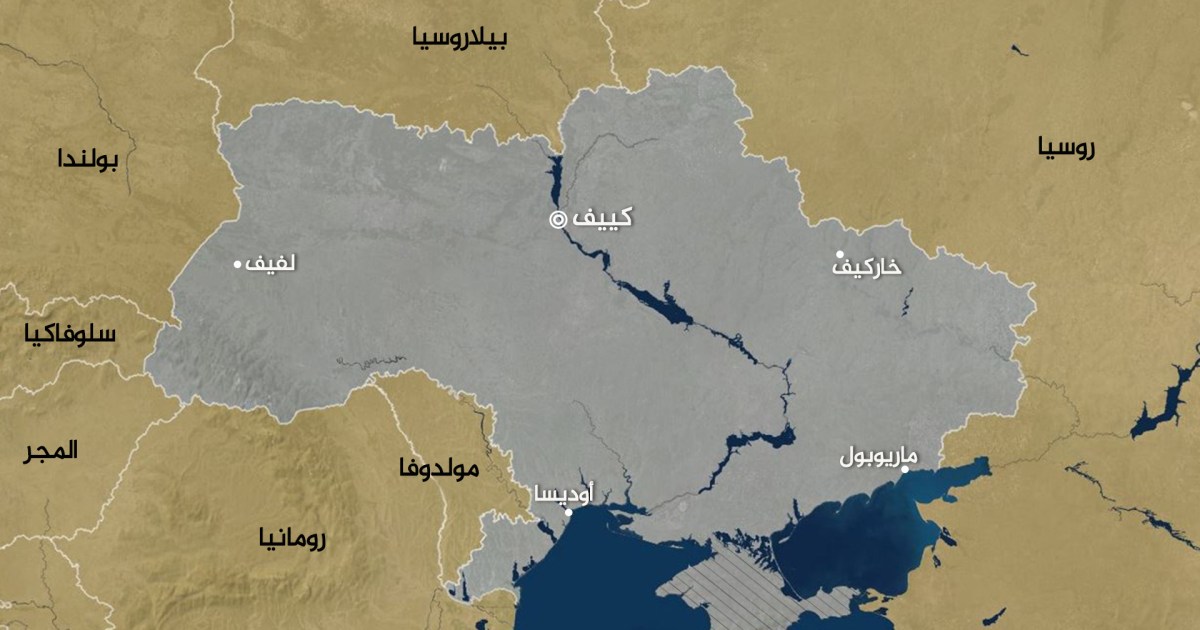Since its independence in 1991, Ukraine, located in eastern Europe, has been a magnet for the West and Russia, which resents the former Soviet republic's rapprochement with Europe in recent years.
Independence and inherited nuclear weapons
On December 1, 1991, Ukraine, then a Soviet republic, voted in a referendum on its independence, which was recognized by Russian President Boris Yeltsin.
On December 8, Russia, Ukraine and Belarus signed the agreement to establish the Commonwealth of Independent States, but Ukraine sought 5 years later to get rid of the political tutelage of its great neighbor, which has been going on for 300 years.
As a result, the country has not fully adhered to the "CIS", which is a Russian-dominated structure in an attempt to return the former Soviet republics to its orbit.
A few years after the end of the Cold War, Russia, Britain and the United States pledged, under an agreement signed in Budapest on December 5, 1994, to respect Ukraine's independence, sovereignty and borders in return for Kiev giving up its atomic weapons inherited from the Soviet Union.
Treaty of friendship with Moscow
On May 31, 1997, Russia and Ukraine signed a treaty of friendship and cooperation without demystifying Kiev's relations with NATO, while Moscow strongly opposes the accession of Ukraine or any other former Soviet republic to the alliance.
The treaty and the texts attached to it regulate, in particular, the thorny issue of sharing the former Soviet fleet in the Black Sea, which is docked in Sebastopol in the Crimea.
Russia retains ownership of most of the ships, but pays Ukraine a modest fee for the use of the port of Sebastopol.
Meanwhile, Russia, which was Kiev's most important trading partner, retained its "economic weapon" against Ukraine, which is highly dependent on Russian oil and gas.
In 2003, Kiev signed an agreement to create a joint economic zone with Russia, Belarus and Kazakhstan, prompting the European Union to warn it that this could impede its rapprochement with the bloc and its accession to the World Trade Organization.
A pro-Western ruler in Kiev
In 2004, the presidential election in Ukraine, marred by fraud and resulting in the victory of the openly Russian-backed candidate Viktor Yanukovych, sparked unprecedented protests, and the polls were annulled.
And the victory of the leader of the "Orange Revolution" on December 26, the pro-Western opponent Viktor Yushchenko - who was exposed to a mysterious case of dioxin poisoning during the campaign - marked the beginning of a new political era in Ukraine after 10 years of President Leonid Kuchma's rule, which ranged between Europe and Moscow.
Upon coming to power, the new Ukrainian president reiterated Ukraine's desire to join the European Union despite objections from the Commission and NATO.
In 2008, at the Bucharest summit, NATO leaders agreed that Ukraine would eventually join the alliance, angering Russia.
The two countries fought a number of political and trade wars, the most important of which were the gas wars in 2006 and 2009, which disrupted energy supplies in Europe and undermined Ukrainian-Russian relations.
The Maidan uprising
In 2010, the new president, Viktor Yanukovych, was elected, who launched a process of rapprochement with Russia, emphasizing that integration with the European Union, with which Kiev has been an "association agreement" since 2008, remains a priority, but in November 2013 the Ukrainian president refused at the last minute and under pressure from the Kremlin. Signing the agreement with the European Union and re-launching economic relations with Moscow.
This shift led to the launch of a pro-European protest movement centered on the central square in Kiev, the Maidan.
That uprising ended in February 2014 with Yanukovych's departure to Russia, and then his dismissal after a bloody repression of protesters that led to hundreds of deaths of demonstrators and 20 policemen.
The annexation of Crimea and the war
At the height of this crisis and in the Crimea, the Russian special forces took control of strategic positions.
In March 2014, Moscow annexed the peninsula, causing the worst diplomatic crisis between the West and Russia since the fall of the Soviet Union.
In April, pro-Russian separatists seized key positions in Donbas (the Russian-speaking industrial region in eastern Ukraine), and clashes turned into war in May.
Since 2014, the conflict has killed more than 14,000 people.
Kiev and the West see that Moscow organized these separatist moves in response to the change of Ukraine's policy in favor of the West.
After mobilizing tens of thousands of soldiers on the Ukrainian border, Vladimir Putin recognized the independence of the two separatist "republics" on February 21, 2022, and ordered the deployment of forces in this region, without revealing the size of this deployment or its timetable.
On February 24, the Russian President announced the start of a "military operation" in Ukraine.

